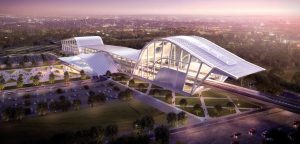 The Prime Minister of Singapore Lee Hsien Loong and the Prime Minister of Malaysia Muhyiddin Yassin agreed to cancel the Kuala Lumpur–Singapore high speed rail project as the two countries were unable to reach an agreement.
The Prime Minister of Singapore Lee Hsien Loong and the Prime Minister of Malaysia Muhyiddin Yassin agreed to cancel the Kuala Lumpur–Singapore high speed rail project as the two countries were unable to reach an agreement.
Due to the impact of COVID-19 pandemic on the Malaysian economy, the Government of Malaysia had proposed several changes to the high-speed rail project. “Both Governments had conducted several discussions regarding the proposed changes and had not been able to reach an agreement. Therefore, the HSR Agreement had lapsed on 31 December 2020,” Singapore’s Prime Minister said in a press release.
The bilateral agreement was signed in 2016 and the construction of the railway line was subsequently suspended, from September 2018 to 31 December 2020, at Malaysia’s request, with the understanding that the extension of the suspension period until 31 December 2020 would be the final extension. 31 December was the second and the final extension of the suspension of the project.
The Malaysian Minister of Economy, Mustapa Mohamed, said that the terms of the agreement signed in 2016 “are no longer viable for Malaysia, given the current economic situation which has adversely affected Malaysia’s fiscal position.”
Since 2018, the Malaysian government explored several alternatives to reduce the cost of the KL – Singapore high speed rail project, which has become more urgent with the onset of the Covid-19 pandemic.
The two countries will abide by their respective obligations, and will now proceed with the necessary actions, resulting from this termination of the HSR agreement.
According to Singapore’s Ministry of Transport, Malaysia allowed the HSR Bilateral Agreement to be terminated and has to compensate Singapore for costs already incurred by Singapore in fulfilling its obligations under the HSR Bilateral Agreement in accordance with the parties’ agreement.
Since mid-2020, the Malaysian government has proposed some changes to the project including structure, alignment and station design. The original project structure would have required substantial and long-term Government guarantees. The new project structure was expected to provide the Government the flexibility in financing options, such as deferred payments, public-private partnerships and the possibility of accessing financing at favourable rates.
“More importantly, the proposed changes to the project structure would have allowed us to leverage on the HSR project to accelerate Malaysia’s economic recovery post the Covid-19 pandemic, by bringing forward the start of the construction phase by almost two years. This would have provided a much-needed boost to our construction sector and its supporting ecosystem,” the Economy Minister said.
The Kuala Lumpur–Singapore high speed rail project was estimated at USD 16 billion and included the construction of a 330-km railway line and 8 stations, of which 7 in Malaysia and one in Jurong East, Singapore. The project was expected to be completed in 2026.
Share on:



